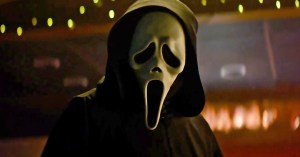Total Recall: Partial Recall
With Total Recall hitting theaters this week, we try to remember some noteworthy films about memory loss.
After many months of examining cinematic history under the Total Recall banner, our column meets its destiny this week with the release of Len Wiseman’s Total Recall remake. Of course, we knew we needed to dedicate this week’s list to recall — specifically, movies featuring protagonists who have lost their memory. Amnesia is a popular topic for filmmakers, leaving us with enough material to make this a special super-sized edition that features examples from pretty much every genre — and we’re still sure we managed to (ahem) “forget” at least one of your favorites. It’s the total partial recall you’ve been waiting for!
Amateur
79%Amnesia can be a heartbreaking ordeal for the afflicted — or, in the case of Amateur‘s Thomas (Martin Donovan), a nifty way of having the reset button pushed on a life that’s gotten bogged down in bad decisions. Of course, as Thomas quickly discovers, the past has a way of catching up to you, even if you’re hiding from it in the arms of a nun-turned-pornographic writer (Isabelle Huppert). A surprising break from writer/director Hal Hartley’s early quirky romances, Amateur still found an appreciative audience with Hartley fans like ReelViews’ James Berardinelli, who wrote, “Certainly, the script fails to do much with the issue of confused identities, its ostensible theme, but Hartley’s style is such a pleasure to watch that it isn’t a major disadvantage for the substance to be weak.”
Anastasia
91%When you don’t even know who you are, it can be awfully dangerous to fall in with the wrong crowd — which is possibly what’s befallen the young amnesiac (played by Ingrid Bergman) at the center of of Anatole Litvak’s Anastasia. Loosely based on a true story, it puts its young heroine at the center of a mystery: Is she really the lost Tsarina Anastasia, or just a patsy being manipulated by a Russian expat (Yul Brynner) with his own shadowy motives? The answer to the real-life question proved far less romantic than the film’s, but for Bosley Crowther of the New York Times, viewers got all the truth they needed on the screen: “Miss Bergman’s performance as the heroine is nothing short of superb,” he wrote, “as she traces the progress of a woman from the depths of derangement and despair through a struggle with doubt and delusion to the accomplishment of courage, pride and love.”
The Bourne Identity
84%It seems laughable now, but before The Bourne Identity reached theaters, there were a lot of people who didn’t think Matt Damon had what it took to be a convincing action hero. Those doubts were quickly erased with director Doug Liman’s sleek, powerful adaptation of the Robert Ludlum novel — a huge box office hit that was powered with equal parts explosive set pieces and a solid central performance by its star. As it turned out, Damon had not only the dramatic chops to realistically portray the fear and confusion of an amnesiac who slowly begins to realize he’s a lethal assassin, but the physical presence to make audiences believe he could kill a man with a pen. The beginning of a trilogy so successful that it’s continuing without Damon, Bourne provided smart popcorn entertainment for critics like Peter Keough of the Boston Phoenix, who quipped, “Who needs an identity when you’re having this much fun?”
Clean Slate
13%With The Bodyguard director Mick Jackson at the helm and SNL legend Dana Carvey in the lead, 1994’s Clean Slate should have been a smash hit. Alas, this putative comedy about a private investigator afflicted with a rare form of amnesia suffered from humiliating reviews and poisonous word of mouth, dooming its theatrical run. Starring as Maurice Pogue, a P.I. who survives an attempted murder but loses the ability to retain his memories of the previous day after going to sleep at night, Carvey was faced with the arduous task of wringing laughs from the screenplay by Robert King (Phantom of the Mall: Eric’s Revenge). Most critics found it forgettable in all the wrong ways, but for Clint Morris of Moviehole, who argued “Carvey’s great,” it was “A comedic Memento.”
Curse of the Jade Scorpion
44%Woody Allen’s most expensive movie — and, perhaps not coincidentally, his least favorite of his own films — 2001’s The Curse of the Jade Scorpion takes your standard Allen starting point (stammering nebbish finds love with improbably attractive woman) and wraps it in a complicated plot involving a crooked magician, hypnosis-induced amnesia, and Dan Aykroyd. It all added up to a pretty lumpy blend, at least as far as most critics were concerned, and audiences couldn’t be bothered to find out whether or not they’d agree. Still, for a handful of scribes, Scorpion‘s sting was sweet: “This isn’t vintage Woody — we haven’t seen that since, oh, Hannah and Her Sisters — but it’s good enough,” argued Jean Lowerison of the San Diego Metropolitan.
Desperately Seeking Susan
86%Incontrovertible proof that amnesia comedies and bustiers go together, Desperately Seeking Susan kicked off Madonna’s once-promising film career with the tale of a bored suburban housewife (Rosanna Arquette) who develops an obsession with a bleach-blonde free spirit named Susan (Madonna) and, through a series of unlikely events, ends up thinking she is Susan. Also, Egyptian jewelry is involved. It’s vintage ’80s cinema, from the shoulder pads in the wardrobes to the storyline’s reliance on madcap humor — but unlike most movies of its ilk, Susan resonated with most critics; as Dave Kehr admitted for the Chicago Reader, “The film acquires a pleasant, syncopated rhythm as it bounces from one unlikely event to another.”
Dark City
78%The protagonist who has no memory of his past, but must find a way to evade capture for crimes he’s sure he didn’t commit: It’s a tale as old as noir, but Alex Proyas’ Dark City tells it with singularly stylish élan, starring Rufus Sewell as an unfortunate soul who wakes up in a bathtub, takes a phone call warning him that men are on their way to capture him, and stumbles across a dead woman on his way out the door. Toss in a city where the sun never shines, a human race prone to random comas, and a telekinetic battle between our hero and a shadowy cabal known as the Strangers, and Dark City is unlike any mindbending love story/trippy action thriller you’ve ever seen; as Stephen Holden argued in his review for the New York Times, it’s “so relentlessly trippy in a fun-house sort of way that it could very easily inspire a daredevil cult of moviegoers who go back again and again to experience its mind-bending twists and turns.”
Eternal Sunshine of the Spotless Mind
93%While he spent the early 1990s mugging it up for fans of perfectly obvious comedy, few people could have guessed that Jim Carrey would wind up sharing top billing with one of the premier actresses of her generation in a mindbending, critically beloved drama about the nature of love and memory — but that’s exactly what he did in Eternal Sunshine of the Spotless Mind, going toe to toe with Kate Winslet in one of the most unusual and eye-catching films of the early aughts. Armed with a script co-written by Charlie Kaufman, director Michel Gondry riddles the film with stunning visual effects that, depending on what you want out of the movie, either deepen its metaphorical layers of meaning or are simply really cool to look at. It’s admittedly too strange and/or chilly to appeal to everyone, but at its heart, the movie lives up to Mariko McDonald of Film Threat’s assessment of it as “fresh, heartfelt and ultimately heartbreaking in its honest portrayal of a modern relationship.”
The Long Kiss Goodnight
67%Renny Harlin movies aren’t exactly known for their character development, and 1996’s Shane Black-scripted The Long Kiss Goodnight is no different — in a movie this obsessed with rapid-fire quips, explosions, and piled-up corpses, you root for the good guys and cheer for the disposal of cartoon villains. Case in point: David Morse’s Luke, a.k.a. Daedalus, an arms-dealing heavy who makes things difficult for the amnesiac CIA assassin played by Geena Davis — first he’s nasty, then he’s dead. But if Goodnight isn’t exactly thoughtful, or even particularly memorable, plenty of critics thought it was good, dumb fun — like Michael Dequina of The Movie Report, who asked, “Who can resist the sight of Davis tossing her daughter from a hole in her house into the nearby treehouse or chasing after a car… while ice skating?”
The Majestic
42%A sentimental ode to the films of Frank Capra — and to the magic of the cinema in general — Frank Darabont’s The Majestic was supposed to wrap audiences up in the heartwarming tale of a rising screenwriter (Jim Carrey) whose promising career is threatened by the HUAC hearings of the 1950s — and then derailed completely when he drunkenly careens off a bridge, loses his memory, and washes up on the shore of a small town where he’s mistaken for a long-lost World War II hero whose family just happens to own a dilapidated movie theater. Alas, most critics found The Majestic overlong and overly sentimental, but it found an appreciative audience with the New York Observer’s Rex Reed, who wrote, “Carrey gets the best role of his own career — and plays it with tenderness, valor, bravery and deeply moving conviction. I find him positively captivating.”
The Manchurian Candidate
97%A pitch-black manifestation of Cold War political paranoia, John Frankenheimer’s The Manchurian Candidate tapped into the lethal turmoil of the post-WWII global landscape to frame the story of a soldier (Laurence Harvey) who’s captured during the Korean War and, along with his men (including Frank Sinatra), subjected to brainwashing by Communist agents. Back home, Harvey’s a war hero, but his programming — and the machinations of his politically ambitious mother (Angela Lansbury) — threaten to unleash dire consequences. The 2004 remake earned positive reviews, but there’s no substitute for the unbearably tense original; wrote Roger Ebert, “Not a moment of The Manchurian Candidate lacks edge and tension and a cynical spin.”
Memento
93%The grim noir puzzle that reaffirmed Pearce’s leading-man talent and served as Christopher Nolan’s full-fledged Hollywood coming-out party, Memento offered an early glimpse of Nolan’s fondness for narrative games — as well as his ability to get the most out of his actors. Playing a man who spends most of the film as not only a mystery to the viewer, but to himself, Pearce won a pile of honors from various film critics’ circles, and was a major part of what led the Los Angeles Times’ Kenneth Turan to call Memento “provocatively structured and thrillingly executed film noir, an intricate, inventive use of cinema’s possibilities that pushes what can be done on screen in an unusual direction.”
Mulholland Drive
83%It resists synopsis and analysis in characteristically Lynchian fashion, but whatever it may or may not actually be about, Mulholland Drive definitely includes scenes depicting a character who appears to be suffering from amnesia, so it would have been uncharitable to leave it off this list. As for the film itself, well, critics have been puzzling over its surreal imagery, nonlinear plot, and jumbled narrative since Mulholland arrived in theaters — but whether or not you can figure out what it all means, argued the New York Observer’s Andrew Sarris, it’s “One of the very few movies in which the pieces not only add up to much more than the whole, but also supersede it with a series of (for the most part) fascinating fragments.”
Overboard
46%The hit 1980s comedy that argued that true happiness lies in leaving behind a life of luxury to do housework for a stranger and his four children, Overboard united real-life sweethearts Goldie Hawn and Kurt Russell for a comedy about a haughty heiress who tries to cheat her carpenter out of payment for a job — then promptly falls off her yacht, loses her memory, and ends up becoming the unwitting pawn in his scheme to pass her off as his wife in order to exact revenge. It sounds like it could be the outline for a brutal psychological thriller — and a major portion of critics just thought it was generally no good — but for Time Out’s Nigel Floyd, Overboard was a “hilarious and touching romantic comedy” that triggered memories of “the integrated plotting and sophisticated dialogue of ’30s Hollywood.”
Paris, Texas
95%Using the windswept desolation of rural Texas as a sort of visual representation of the loss felt by a man with no memory, Wim Wenders’ Paris, Texas follows the ambling trail of Travis Henderson (Harry Dean Stanton) after he emerges from the desert, collapses in a saloon, and is reconnected with his brother (Dean Stockwell) and estranged son (Hunter Carson). While far from the most mainstream offering on this week’s list, it might be one of the most emotionally affecting; as Luke Y. Thompson argued for New Times, “Wenders’ slow, moody style isn’t for everyone, but this is the epitome of it.”
Spellbound
86%At Vermont’s Green Manors mental hospital, it’s hard to tell who’s more in need of therapy — the patients, or the new director (Gregory Peck), an eccentric fellow whose quickly multiplying quirks turn out to mask a case of amnesia that might have something to do with murder. This mid-period Hitchcock thriller rests on a series of coincidences — and seems to exhibit a rather hostile view of the psychology profession — but critics were mostly, well, spellbound by Spellbound; as John J. Puccio wrote for Movie Metropolis, “It may not be first-rank Hitchcock, but even second-tier Hitchcock is better than what most other directors produce.”
Total Recall
81%Loosely based on Philip K. Dick’s short story “We Can Remember It for You Wholesale,” Total Recall placed peak-era Arnold Schwarzenegger square in the middle of a ruthlessly high-concept plot about a construction worker on a distant future version of Earth (or is he?) who pays for an exotic memory implant, changes his mind at the last minute, and suddenly finds himself at the center of a long-brewing political revolution on Mars (or does he?). Part thought-provoking sci-fi flick, part mindless FX extravaganza, Recall was a huge box office hit, spinning off a TV series, a scrapped sequel (which eventually morphed into Minority Report), and, of course, this week’s main feature. “Total Recall is too much,” admitted Entertainment Weekly’s Owen Gleiberman, “but it’s too much of a good thing.”
Take a look through the rest of our Total Recall archives. And don’t forget to check out the reviews for Total Recall.






